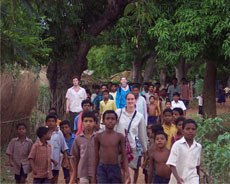UI students bring light to Indian village

Tim Eggerding
January 21, 2005
Nearly 130 households in the village of Badakamandara, India, will be a little brighter this year thanks to the work of about 20 University students volunteering to provide electricity for the first time to the community.
These students are working with Engineers Without Borders (EWB), a nonprofit organization that implements environmentally and economically sustainable engineering projects in developing communities.
Malia Appleford, project coordinator and graduate student in engineering, said the students began working on the project last January.
“We are very excited as engineers to be able to contribute to these people’s lives,” Appleford said.
The electricity will be provided through the processing of oil seeds about the size of walnuts. The villagers will harvest the seeds picked from surrounding trees. Once the seeds are dried in the sun or in an oven, they will be put into a manual hydraulic press to squeeze out the oil. The oil, once extracted, filtered and preheated, will be used as biodiesel fuel in a motorized generator.
Get The Daily Illini in your inbox!
The generator will be turned on in the late evening and will run for three hours a night. Each household in the village will be supplied with a few compact fluorescent light bulbs.
Keith Burrows, senior in engineering, said households in the village currently use kerosene lanterns at night. But Burrows said kerosene is a low-power light source that causes strain to the eyes.
“We want to reduce the amount of kerosene to improve health and economic conditions,” Burrows said.
Students rejected using solar- and wind-generated electricity because of high costs. Appleford said the oil seed fuel is different than typical biodiesel. Whereas biodiesel fuel is usually chemically altered, the oil seed fuel is concentrated for safety and to eliminate the expense of extra chemicals, she said.
EWB will send a student to India on Feb. 1 to lay the groundwork for the project. Dan Weintritt, senior in engineering, will work with the community of Badakamandara and the Association for India’s Development (AID India) to figure out how to manage the project within the community. The other members hope to travel to the village over spring break to join him.
Appleford estimated the cost of the project to be between $15,000 and $20,000. The group is fund-raising to cover the costs, but Appleford said the group has faced other challenges such as organizing the project from nearly half a world away and maintaining communication with people overseas.
“Questions have popped up,” Appleford said. “We need to know how expensive wire is, for example, and exactly how many households will be affected. But it’s a ten-and-a-half-hour time difference, and there are different cultural expectations of how things should work.”
Village representatives in India contacted the national EWB organization about the project. The University chapter of EWB was assigned the project, and group members visited India during the summer.
Burrows said it was an incredible experience.
“It helped us understand the situation a lot better, understand the area and the people,” Burrows said. “Initially I thought it would be mostly technical work, but it isn’t. We’re working with people.”
Bruce Litchfield, faculty advisor for EWB and professor of engineering, said the project has been a life-changing experience for many of the students involved.
“Besides just helping people that need it, it has been an incredible educational opportunity for the students to see the world differently,” Litchfield said.






